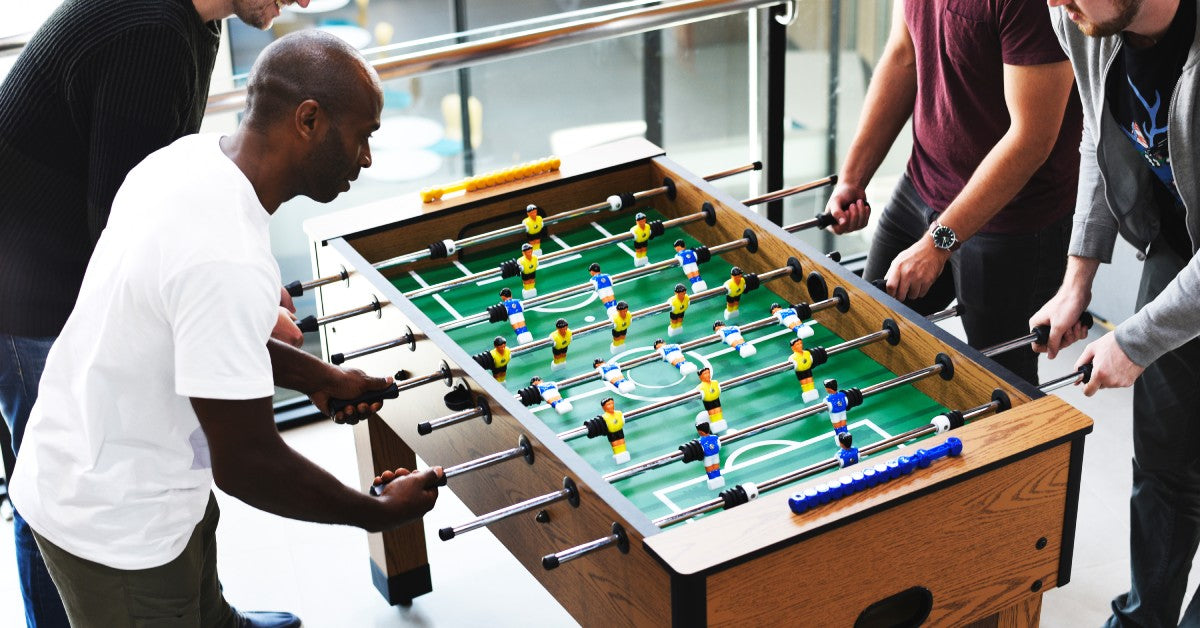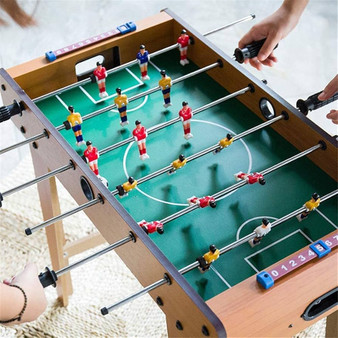Foosball is a popular tabletop game that combines quick reflexes, strategy, and precision. Whether you’re playing casually with friends or aiming to sharpen your skills, understanding the basics, rules, and strategies can greatly improve your experience. This article provides a detailed guide on how do you play foosball tips, tricks, and rules to help you navigate the game effectively.
What Is Foosball?
Foosball, also known as table soccer, is played on a specialized table that mimics a soccer field. The game features miniature figures mounted on rotating rods. Each player controls these figures to pass, defend, and score goals. The objective is to be the first to reach a set number of goals, typically five or more, depending on the agreed rules.
Basic Setup of a Foosball Table
Before diving into the game, it’s helpful to understand the foosball table’s structure. A standard table includes:
- Four Rods per Team: Each with a specific function—goalie rod, defense rod, midfield rod, and forward rod.
- Foosball Men: Players attached to the rods, usually color-coded for each team.
- Ball: A small, lightweight foosball used to score goals.

Rod Positions:
- 1-man goalie rod
- 2-man defense rod
- 5-man midfield rod
- 3-man offensive rod
Each rod serves a distinct purpose, and mastering their movements is key to playing effectively.
Basic Rules of Foosball
When learning how do you play foosball? tips, tricks, and rules, starting with the fundamental rules ensures fair and enjoyable gameplay.
1. Starting the Game
A coin toss typically decides which player serves first. The ball is placed through a serving hole at the center of the table.
2. Scoring Goals
A goal counts when the ball completely crosses the goal line. The player who concedes the goal serves the ball in the next round.
3. No Spinning Rule
One of the most important rules is the prohibition of spinning. Spinning means turning the rods more than 360 degrees before or after striking the ball. It reduces control and is not allowed in regulated play.
4. Dead Ball Situations
If the ball stops in an area unreachable by the players, it is considered a dead ball. If it stops between the goalie and the nearest defense rod, the goalie resumes play. Otherwise, the ball is served again.
5. Time Limits
Each player is generally allowed a limited time to possess the ball on each rod:
- 10 seconds on the midfield rod
- 15 seconds on defense and forward rods
These time limits keep the game moving and prevent stalling.
Foosball Playing Techniques
Knowing the basic movements and strategies can make a big difference in your gameplay. Here are essential techniques to develop:
1. Passing the Ball
Accurate passing between rods is critical. Mastering push passes, pull passes, and brush passes allows players to move the ball efficiently toward the opponent’s goal.
2. Shooting Techniques
A strong offense relies on effective shooting skills. Some common shots include:
- Push Shot: Moving the ball laterally before striking.
- Pull Shot: Pulling the ball in the opposite direction before shooting.
- Snake Shot: A popular advanced shot that involves rapid wrist movement.
3. Defense Strategies
Good defense can prevent the opponent from scoring easily. Positioning the defensive rods effectively and reacting quickly to the opponent’s movements are key defensive skills.
4. Controlled Movements
It’s important to keep your movements smooth and controlled rather than relying on random spinning or frantic rod turns.
Tips to Improve Your Foosball Game
Whether you're a beginner or looking to enhance your skills, applying practical tips can significantly elevate your performance.
1. Maintain Proper Grip
Holding the rods correctly helps control the ball better. A relaxed, firm grip allows quicker wrist movement and more accurate shots.
2. Develop Quick Reflexes
Foosball is a fast-paced game. Practicing regularly sharpens reaction times, helping you respond quickly to sudden ball movements.
3. Master Ball Control
Learning to stop, trap, and pass the ball effectively is just as crucial as scoring goals. Practicing ball control builds confidence and precision.
4. Watch Experienced Players
Observing skilled foosball players can teach valuable tactics, shooting patterns, and defensive positioning.
5. Focus on Defense
While scoring is exciting, focusing on a strong defense can often win matches. Solid defensive positioning forces your opponent to make difficult shots.
Common Mistakes to Avoid in Foosball
When learning how do you play foosball? tips, tricks, and rules, it's helpful to know common pitfalls that can hinder your progress.
1. Spinning the Rods
Spinning is not only against the rules but also ineffective. It reduces accuracy and control.
2. Ignoring Defensive Play
Some beginners concentrate only on offense and neglect defense. Both are equally important.
3. Rushing Shots
Taking shots without aiming reduces scoring chances. Controlled, well-aimed shots are more successful.
4. Over-Gripping the Rods
A tense grip can slow you down and cause fatigue. Keeping your hands relaxed improves flexibility.
Basic Foosball Etiquette
Good sportsmanship is essential for an enjoyable foosball game.
- Respect the Rules: Stick to the agreed game rules.
- Avoid Aggression: Handle the rods carefully to prevent damage to the table.
- Be Fair: Allow time for the opponent to reposition after a goal.
- Shake Hands: Win or lose, ending with a handshake maintains friendly competition.
Conclusion
Understanding how do you play foosbal tips, tricks, and rules helps make the game more enjoyable and competitive. From learning the basic rules to applying advanced techniques, each aspect contributes to improving your gameplay. Whether you're playing at home, in a recreational center, or joining a tournament, foosball is a rewarding activity that sharpens your reflexes, strategy, and coordination.
By focusing on skill development, fair play, and steady practice, anyone can become a more competent foosball player. Enjoy each game, challenge yourself, and remember that mastery comes with time and dedication.





